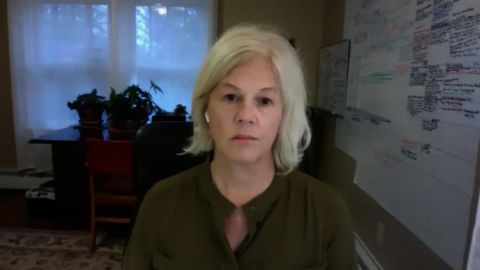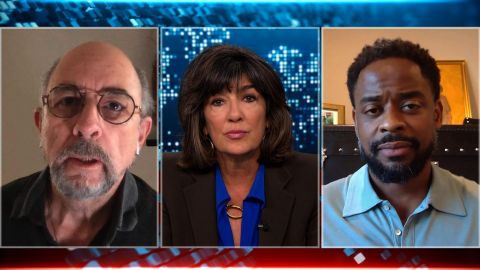Read Transcript EXPAND
CHRISTIANE AMANPOUR: Now, another consequence of the COVID pandemic has been an epidemic of drugs and opioid related deaths, which are up in more than 40 states, while many addiction treatment centers have been forced to shut their doors. Beth Macy is a veteran reporter on this beat in the United States. And she has written a book about it and it’s called Dopesick: Dealers, Doctors, and the Drug Company That Addicted America, tackling this was an early Trump pledge. But Macy tells our Michel Martin, why she thinks Biden has a more coherent plan to end this suffering.
MICHEL MARTIN: Thanks, Christiane, Beth Macy, thank you so much for joining us once again.
BETH MACY, AUTHOR: It’s great to be here, Michel.
MARTIN: I think people who are familiar with your powerful work in your book Dopesick, will remember that you’ve spent many, many years in fact decades reporting on the development of the opioid crisis in this country. And last week, there was news, the Department of Justice announced an $8 billion settlement with Purdue Pharma, the maker of Oxycontin for its role in fueling the nation’s opioid crisis. So would you just briefly tell us like what is the allegation against? What is the argument that the Department of Justice made and what was Purdue Pharma’s role in fueling this crisis as briefly as you can?
MACY: So you might recall, and my book goes into great detail that the government proved that Purdue had criminally misbranded the drug in its early years. So there was a settlement in 2007 for criminally misbranding, basically exaggerating the advocacy of the drug and downplaying the risks. And part of that settlement, they signed a corporate integrity agreement saying, you know, they weren’t going to do that anymore, and they were going to bide by the rules. But what the Justice Department found out in their years long investigation was that they were providing kickbacks to health care companies. A few doctors were paid bribes. And it was business as usual. They lied to the DEA, it seemed to be business as usual. And I think that, Michel, if you’re and I had committed such a heinous crime and pled guilty to it in ’07, and then got caught doing that and worse, two weeks before an election, which is worth pointing out. A lot of people think that this announcement was time to make President Trump look like you had a really good win against the opioid crisis. But I think if you and I had we’d be in jail. And so when I interview the families that I’ve spent time with, when I talk to the mothers and the dads who’ve lost their families, the activists on the ground, the harm reduction workers in these rural, distressed communities. This doesn’t look like justice to them. This looks like billionaires get to get away.
MARTIN: Does anybody go to jail under the settlement?
MACY: Nobody goes to jail under the settlement. The one silver lining is that it doesn’t preclude further charges. The other big complicating factor so you have these big headlines last week saying when against Purdue $8 billion, but really, right now they’re in bankruptcy court in White Plains, like there was a hearing yesterday with Judge Drain, the bankruptcy judge, about whether or not the Sackler family could take their 225 million fine from a company or whether it had to come from them. And this kind of stuff. And it was real clear that the judge is going to be the ultimate decider on all of this. So it’s not going to be anywhere near 8 billion. And it’s very clear that no one still is going to jail. The parents are still holding out hope. There’s a couple pretty aggressive Attorney General’s leading the way they’re called non-consenting states, Maura Healey in Massachusetts, Leticia James in New York, and they say they are not giving up in this and the parents are holding a lot of hope out for that. But a lot of people who follow this story, think it’s a foregone conclusion that the Sacklers ultimately will get immunity from all of this.
MARTIN: The Sackler being the family that owns Purdue Pharma, the dominant shareholders in Purdue Pharma. Exactly?
MACY: Exactly, yes, it was a privately held company. They were clearly holding the reins of the company. Even in recent years and, you know, they profited to the tune of 13 plus billion dollars.
MARTIN: Obviously, if this is your life, if this is something you’ve been living with, for all these years, that you know these facts very well, but for people who don’t just tell us the scope of the damage that’s been done, because of the opioid crisis in this country.
MACY: So we’ve lost about 450,000 people to opioid overdose deaths.
MARTIN: In what timeframe is that?
MACY: In that sense, Oxycontin was first released in 1996. And, of course – –
MARTIN: So just in 1996, we’ve lost 450,000 overdoses and that we’re not even talking about people who are living with ongoing addictions?
MACY: Absolutely. We have about 2.6 million Americans addicted to opioids. But counting heroin and fentanyl deaths and prescription opioid deaths, not just Oxycontin, but others as well, we’ve lost 450,000 Americans. What that looks like on the ground is what the company did early on was they targeted doctors who were already prescribing competing opioids with the news that the FDA allows us to say we have this really, really strong opioid. And because it has this time release mechanism, it’s safe to use. Well, we know — they knew right away, it wasn’t safe to use. But they also put the narrative that opioids in general were safe for everything. So suddenly you had doctors prescribing kids getting wisdom to surgery, Oxycontin, TMJ, osteoporosis, a lot of older folks with chronic pain issues. And so they flip the narrative with the help of pain societies that they also funded, and doctors that they also fund it to say, to reverse the narrative that for 100 years, we knew that opioids were addictive and should only be used in severe pain, cancer and of life.
MARTIN: Now, first of all, I have to ask you about the other crisis this country is dealing with the one that is in the headlines every day, which is a coronavirus epidemic, which is a global sort of crisis. How has this – how have these two crises kind of affecting each other? Has there been an effect of this all the COVID-19 shutdowns and all the measures taken to address it? Have they had an impact on people who are already experiencing the opioid crisis?
MACY: Absolutely. It’s just been devastating for people with opioid use disorder. According to all of my sources, and I’ve got sources all over the nation. The national figure that came out this summer was that over substance use overall is up 13 percent among everyone, that’s all of us. But opioid overdoses also have gone up 13 percent. Now in the communities that I report from which are largely distressed communities, my sources are telling me that overdoses are up 25 to 40 percent in some of these areas. And as the unemployment rate goes up higher, a lot of these folks are service workers, a lot of their folks have lost their jobs. Their unemployment has run out. The drug supply has been changed because of issues at the border. And a lot of people have switched to methadone, or I’m sorry, to methamphetamine from opioids, but now it has fentanyl in it. So they’re not carrying Narcan because they’re not opioid users might don’t know it has fentanyl in it. And then they’re dying from that the fentanyl is very, very potent. And it’s literally cheaper than bottled water right now. So that’s what we’re seeing. One doctor who has a four or five MAT clinics, and he — he’s really excited, especially at the beginning is like that this is the best thing. We should have been doing this for years. SAMHSA and the DEA relaxed the guidelines for initiating people on buprenorphine, which is the medication assisted treatment that helps people and methadone. And so all of a sudden, they could do telehealth, even the initial call. And it was really good for people in rural areas that had a hard time affording gas money to get to the clinic where they had to do their drug screen once a week and check in with the doctor. So he was now doing check-ins and he was so excited about, he’s like, Oh, we should have been doing this for years. But now he started to see the impact of the economy and COVID on his patients. So where they were once in their homes or in their apartments, now they’re in their cars, or they’re in homeless encampments. And, you know, he said, he’ll see a little kid in the backseat doing her school on Zoom. And a lot of these families will check in to a motel on the weekend to take a shower. And then they have to go back to their cars. And it’s really, really stressful on people right now. I mean, it’s stressful on all of us, right? This is just a crazy time.
MARTIN: So, Beth, can you tell us a bit more about who is most vulnerable during this pandemic. The people who are most vulnerable are those who are in active addiction because they have to have that opioid in order not to be dopesick. And that’s what they’re chasing at this point. They’re not chasing the high, they’re chasing not being in excruciating withdrawal. So they’re the most vulnerable to getting pills that have been pressed with fentanyl or methamphetamine that’s been spiked with fentanyl. And that’s why it’s so important that they get access low barrier access to methadone or buprenorphine.
MARTIN: Because I understand that the Centers for Disease Control estimates that there have been something like 75,000, more than 75,000 overdose deaths in the 12-month period between March of 2019 and March of 2020, which is just an increase of 10 percent. If these patterns hold, forgive me for asking you to speculate how bad could it get?
MACY: Yes, I mean, a lot of people think it’s going to be our worst year ever. Trump touted like, you know, the 2018 data was a slight decrease in overdoses. But ’19 was up and this year is looking worse than ever. And folks are working so hard. You know, one recovery worker said, you know, I feel like we’re just drowning here.
MARTIN: Well, though, this economic pressure play in this, I mean because one of the other points as you made is a lot of this crisis kind of took hold and places that were already struggling. So what role does the economic pressure play in that?
MACY: Yes, it’s a huge role. I mean, we still have only a third of the country has college degrees, right. And in these communities where the factory work went away, very little was done to assuage the damages in those communities. I’m reporting from a rural town in North Carolina right now that has the 10th highest rate of — has one of the highest opioid overdose rates in the in the state and in the nation, and as well as hepatitis C. And when you dig down on their data, what they have is a really high correlation between opioid prescribing from the very beginning when Purdue had unleashed Oxycontin and workforce participation. So the places that have the lowest workforce participation right now and you have some communities that have less than 50 percent especially a middle aged man not working and pushing the opioids at the same time, it was just — that was the special recipe for social disaster in those communities. So it’s very much an economic story. And a case of I think we too often blame the drug users instead of placing the blame where it belongs on the lack of regulation, government regulation that allows something like this to happen. And as well as allows CEOs to close these factories and not do anything for the communities they’ve left behind, because they were chasing a cheaper wage elsewhere, and a bigger profit.
MARTIN: And what are your concerns as this crisis continues? And as we are speaking now, there still hasn’t been a second relief package. I mean, there was one earlier in the year where people got some support. They got some enhanced unemployment benefits and things of that sort, but that those funds have lapsed, and nothing is taking place.
MACY: Absolutely.
MARTIN: So what are your concerns as this continues?
MACY: Well, in these rural communities, where I report from, there are a lot of — it’s expensive to get on these medications for opioid use disorder. And a lot of folks are just going without, and that’s when they’re most likely to relapse and die. And you’re seeing homelessness, sex were on the increase. It’s just a problem that’s getting worse. And the people who are working in this population are really overwhelmed. They need help.
MARTIN: Has this crisis been a part of our national conversation over the course of this election year? I just don’t recall it being a very big part of our conversation. I mean, has it been?
MACY: No, it hasn’t been and there’s just so much crazy news coming out every hour, it hardly gets any attention. I think the Trump administration has bungled their response to the crisis. They were — we didn’t even have a drugs are for many years. And the people high up or offline political appointees. He — There were about $6 billion came down from the federal government during his administration. But there were there were so many other things that could have been done, including just a rallying call around this issue, one of the easy things he could have done or, you know, at the federal level could have been changed was to X the X waiver, which is this bureaucratic requirement that makes it so that doctors who are going to prescribe buprenorphine have to get a DEA waiver. And it’s part of the reason we only have 8 percent of doctors who are even willing to do that, which is why people love going to the black market for buprenorphine.
MARTIN: Which is why it’s part of a Medically-Assisted Treatment Program.
MACY: Yes. Yes.
MARTIN: And you’re very few doctors —
MACY: Absolutely.
MARTIN: — can prescribe it because they have to —
MACY: Right.
MARTIN: — go slow (ph) process to get authorization to do it.
MACY: And that would have been an easy fix. France did it 25 years ago at the height of a heroin epidemic, and they reduce their overdoses by 79 percent. So, you know, I think a lot of could have been done with regard to law enforcement, taking people having police. You know, there’s — there were good examples, in places like Burlington, Vermont, where they realized that every single overdose they had in 2018 was somebody who had come into contact with police. So they start this program with the mayor and the city — the mayor and the police chief and the head of the nonprofit hospital, and instead of arresting people, when they find them with heroin, they literally drive them to treatment. And the police there told me like, you know, we’re not supposed to do that, we’re supposed to arrest the bad guys. And they realize as they got into this population, and started spending more time, that weren’t the bad guys. They were victims of this crisis too.
MARTIN: And what about the Biden campaign? Does the Biden campaign have a coherent strategy to address this?
MACY: Yes, I really think he does. He says he put in 125 billion over 10 years, and that he would scale up drug addiction treatment, and other prevention programs paid for with higher taxes on farmer profits, which sounds good to a lot of these families. And he would try to slow the flow of drugs from the illicit drugs from China and Mexico. You know, he was one of the authors have some war on drugs policies in the 80s and 90s. That really hurt communities as particular communities of color. So I think this is his chance to give back and to undo some of the damage that we still see. By far larger numbers of people of color being incarcerated, we know that whites are used drugs at a higher rate.
MARTIN: Beth Macy, thank you.
MACY: Thank you.
About This Episode EXPAND
French European Parliament Member Nathalie Loiseau reacts to Thursday’s terrorist attack in Nice. “West Wing” actors Richard Schiff and Dulé Hill discuss voter suppression and the 2020 election. Yonit Levi discusses the 25-year anniversary of the assassination of Israeli Prime Minister Yitzhak Rabin. “Dopesick” author Beth Macy explains how the COVID-19 pandemic exacerbates the opioid crisis.
LEARN MORE



